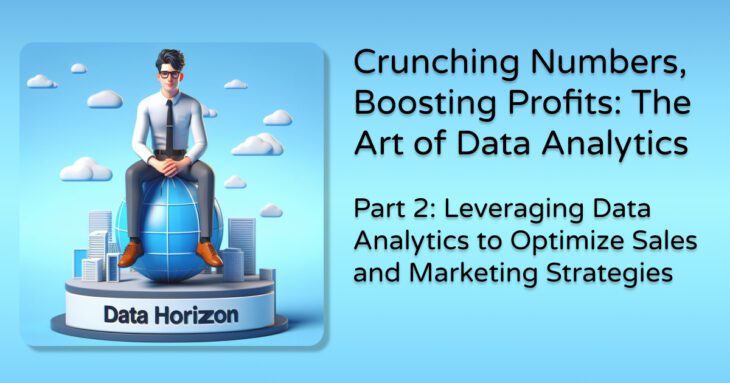Welcome back to the second installment of our insightful series on data analytics. In this article, we will focus on how organizations can leverage data analytics to optimize sales and marketing strategies. By harnessing the power of data-driven insights, businesses can enhance customer engagement, drive revenue growth, and maximize profitability. Let’s explore the key strategies, methodologies, and real-world examples that illustrate the transformative impact of data analytics on sales and marketing effectiveness.
Understanding Customer Behavior
Analyzing Customer Preferences
One of the primary objectives of data analytics in sales and marketing is to understand customer preferences, behaviors, and trends. By analyzing customer interactions, purchase history, browsing behavior, and feedback, organizations can segment their target audience, tailor marketing campaigns, and personalize customer experiences. This targeted approach enables businesses to optimize sales funnels, improve conversion rates, and enhance customer satisfaction, thereby driving revenue growth and profitability.
Optimizing Sales Funnels
Data analytics plays a crucial role in optimizing sales funnels by identifying bottlenecks, inefficiencies, and opportunities for improvement. By analyzing key performance indicators (KPIs) such as conversion rates, average order value, customer lifetime value, and churn rates, organizations can identify areas for optimization, refine sales strategies, and implement targeted interventions that accelerate sales cycles, increase transaction volumes, and maximize revenue generation.
Leveraging Data Analytics in Marketing Campaigns
Personalizing Marketing Campaigns
Data analytics empowers organizations to personalize marketing campaigns based on individual customer preferences, behaviors, and characteristics. By leveraging predictive analytics, machine learning algorithms, and segmentation techniques, businesses can create targeted, relevant, and timely marketing messages that resonate with their target audience, drive engagement, and maximize campaign effectiveness. This personalized approach enhances customer loyalty, increases brand awareness, and generates a higher return on investment (ROI) for marketing initiatives.
Measuring Marketing Effectiveness
One of the key benefits of data analytics in marketing is the ability to measure, monitor, and optimize campaign performance. By establishing clear objectives, defining relevant KPIs, and implementing robust analytics tools and dashboards, organizations can track campaign metrics, assess ROI, and make data-driven decisions that optimize marketing spend, allocate resources effectively, and maximize profitability. This analytical approach enables businesses to identify successful strategies, replicate best practices, and continuously improve marketing performance over time.
Real-world Examples
To illustrate the transformative impact of data analytics on sales and marketing effectiveness, let’s explore a few real-world examples showcasing organizations that have leveraged data-driven strategies to drive revenue growth, enhance customer engagement, and maximize profitability:
- E-commerce Platform: Leading e-commerce platforms utilize data analytics to analyze customer browsing behavior, optimize product recommendations, personalize marketing messages, and enhance user experience, thereby increasing conversion rates, average order value, and customer lifetime value.
- Hospitality Industry: Hotels and resorts leverage data analytics to analyze guest preferences, optimize pricing strategies, personalize promotional offers, and enhance customer loyalty programs, thereby increasing occupancy rates, revenue per available room (RevPAR), and overall profitability.
- Consumer Goods Sector: Consumer goods companies utilize data analytics to analyze market trends, assess competitive landscapes, optimize product portfolios, and personalize marketing campaigns, thereby gaining market share, increasing brand equity, and maximizing shareholder value.
As we conclude this enlightening exploration of leveraging data analytics to optimize sales and marketing strategies, it becomes increasingly evident that embracing a data-driven approach is essential for driving revenue growth, enhancing customer engagement, and maximizing profitability. By understanding customer behavior, optimizing sales funnels, personalizing marketing campaigns, and measuring marketing effectiveness, organizations can gain a competitive edge and ensure long-term success in today’s dynamic marketplace.
